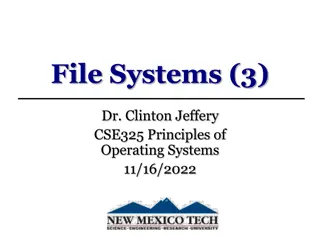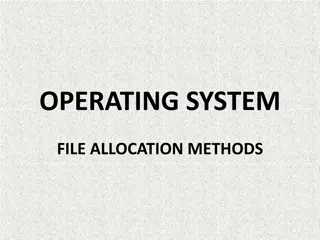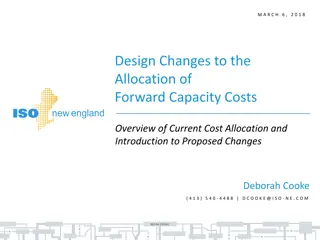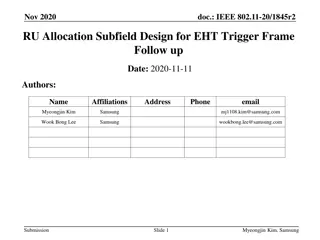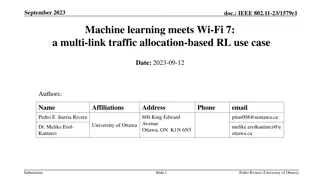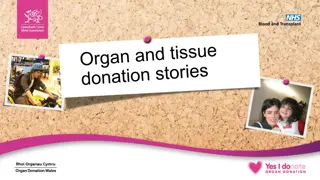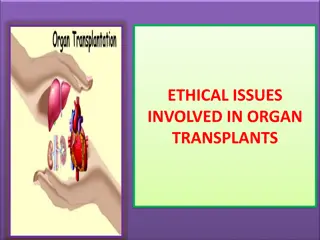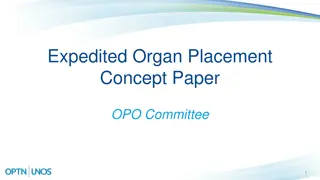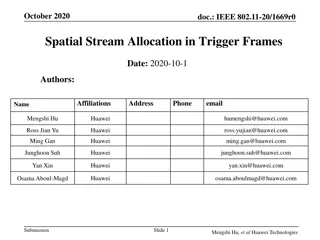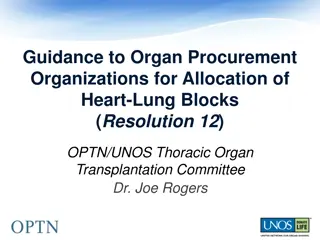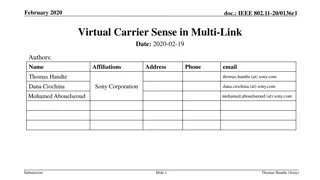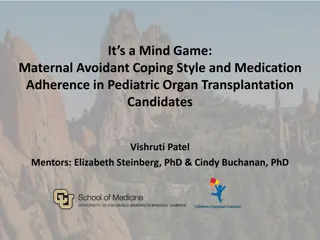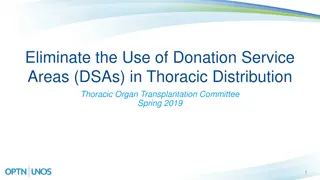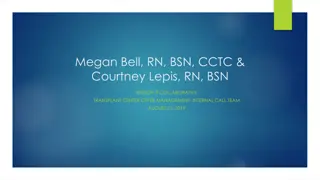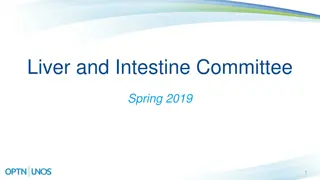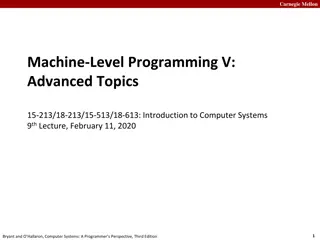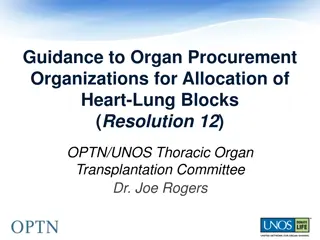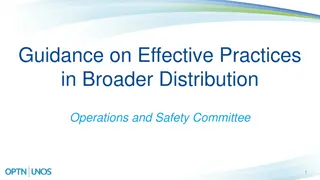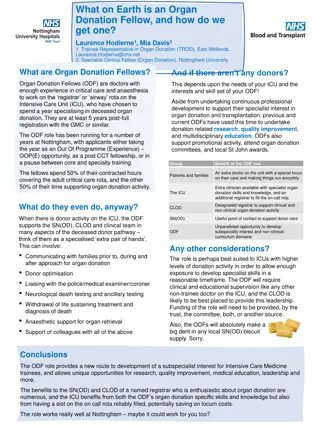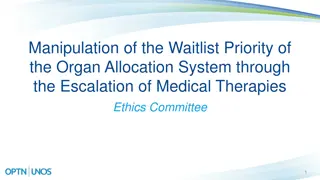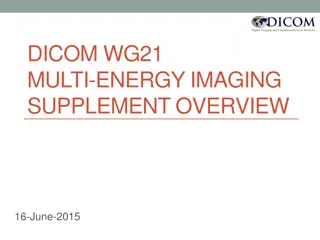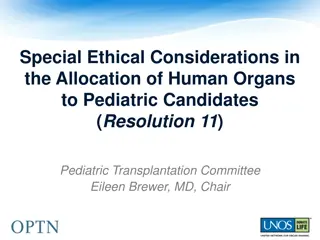Java Allocation and C2
Java object allocation and escape analysis play crucial roles in memory management and performance optimization within the Java Virtual Machine (JVM). This comprehensive overview covers topics such as object vs. scalar allocation, object allocation mechanisms, hotspot escape analysis, ideal and conn
2 views • 22 slides
Understanding Shock: Causes, Symptoms, and Stages
Shock is a critical condition caused by an imbalance between cellular oxygen supply and demand, leading to organ dysfunction. Compensatory responses include increased heart rate, vasoconstriction, and hormonal adjustments. Recognizable features of shock include tachycardia, hypotension, cool clammy
3 views • 27 slides
Understanding Organ Donation in Hong Kong
Explore the various aspects of organ donation in Hong Kong, including suitable organs for donation, living and cadaveric donation processes, low donation rates, common misconceptions, and how to register as an organ donor through the Centralised Organ Donation Register. Discover the opt-in and opt-o
3 views • 28 slides
Scandiatransplant Activities and Awards in 2023
Scandiatransplant is the organ exchange organization serving Denmark, Finland, Iceland, Norway, Sweden, and Estonia. They facilitate kidney, liver, thoracic, pancreas, and islet transplantations. The organization aims to maintain transparency and ethical practices while operating a common waiting li
2 views • 45 slides
Understanding File Allocation Strategies in Operating Systems
Explore various file allocation schemes like extent-based systems, linked allocation, file allocation table (FAT), indexed allocation, and combined schemes used in operating systems. Learn about their pros and cons, including details on maximum file size calculations based on disk block sizes and po
0 views • 20 slides
Operating System: File Allocation Methods
File allocation methods in operating systems determine how files are stored in disk blocks. The main methods include Contiguous Allocation, Linked Allocation, and Indexed Allocation. Contiguous Allocation involves allocating blocks in a contiguous manner for efficient disk space utilization and fast
0 views • 14 slides
Proposed Changes to Forward Capacity Cost Allocation
The document discusses proposed changes to the allocation of forward capacity costs effective June 1, 2020. It highlights the need for transparency in cost allocation, focusing on zonal demand curves and the Marginal-Reliability Impact. The current opaque method is critiqued for potential non-intuit
0 views • 47 slides
Designing 9-Bit RU Allocation Subfield for EHT Trigger Frame in IEEE 802.11-20
IEEE 802.11-20/1845r2 presents a proposal for enhancing the RU allocation subfield design in the EHT Trigger frame to accommodate bandwidth support up to 320MHz and multiple RU or MRU allocations for UL MU transmissions in the 11be standard. The modification addresses inconsistencies in MRU mapping
0 views • 34 slides
Machine Learning Meets Wi-Fi 7: Multi-Link Traffic Allocation-Based RL Use Case
The paper discusses the application of a Reinforcement Learning algorithm, Multi-Headed Recurrent Soft-Actor Critic, for optimizing traffic allocation in IEEE 802.11be Multi-Link Operation networks. This work aims to enhance throughput and reduce latency in MLO-capable devices by distributing incomi
0 views • 18 slides
Organ Donation Awareness and Education Activities
Explore the importance of organ donation through engaging activities, such as quizzes on organ and tissue donation facts and myths. Learn about the various organs and tissues that can be donated, the significance of registering on the NHS Organ Donor Register, and the impact of organ donation in sav
1 views • 26 slides
Ethical Issues in Organ Transplants
Organ transplantation involves the moving of organs from one body to another to replace damaged or absent organs. The process includes cadaveric and living organ donations, with various transplantable organs like lungs, kidneys, heart, and more. There are ethical issues surrounding organ donation de
0 views • 16 slides
Expedited Organ Placement Concept Paper - Addressing Critical Transplant System Issues
This concept paper outlines a proposal to address key challenges in the current organ transplant system, such as lack of transparency and consistency in organ placement. The focus is on developing an expedited placement system with specific triggers and qualifications to improve access to organs for
0 views • 9 slides
Risk Allocation for Allocation Wells in Energy Law
Definition of allocation wells in energy law, advantages and disadvantages, lessees' rights, allocation of production to mineral owners, and legal cases related to pooling agreements. The content discusses various aspects of risk allocation for unagreed horizontal wells and the importance of clear a
0 views • 16 slides
Spatial Stream Allocation in IEEE 802.11-20 Trigger Frames
The document discusses spatial stream allocation in IEEE 802.11-20 trigger frames, specifically focusing on the SS Allocation subfield. It explains how trigger frames allocate resources for TB PPDU transmissions and solicit User Info fields, detailing the RU Allocation and SS Allocation subfields. T
3 views • 15 slides
National Histopathology Service for Organ Retrieval and Transplantation - Audit Findings
The need for a national histopathology service for organ retrieval and transplantation is highlighted, with a focus on the importance of histopathological analysis in assessing donor organ quality and identifying lesions for further investigation. The audit findings show the incidence of urgent hist
0 views • 17 slides
Enhancing Heart-Lung Allocation Policy for Organ Transplantation
This project focuses on improving the allocation of heart-lung blocks for organ transplantation by providing clear guidelines to Organ Procurement Organizations (OPOs). The goal is to ensure consistent practices among OPOs across the country, promoting fairness and efficiency in organ allocation. Th
0 views • 11 slides
Virtual Carrier Sense in Asynchronous Multi-Link Networks
Exploring the implementation of virtual carrier sense in asynchronous multi-link networks based on IEEE 802.11 standards. The presentation discusses the benefits of using NAV (Network Allocation Vector) in asynchronous multi-link setups to avoid hidden node issues, improve throughput, and latency. I
0 views • 16 slides
Virtual Carrier Sense in Multi-Link Networks
This document discusses the implementation and advantages of virtual carrier sense in multi-link networks under the IEEE 802.11 standard. It explores the operation of multi-link setups, asynchronous communication benefits, and the necessity of multiple contention channels. The concept of NAV (Networ
2 views • 11 slides
Understanding Maternal Avoidant Coping and Medication Adherence in Pediatric Organ Transplant Candidates
Maternal avoidant coping styles may impact medication adherence in pediatric organ transplantation candidates. Challenges in the field include organ shortage, patient non-adherence, and identifying health risk factors for effective organ allocation. Parents' coping behavior factors of stress include
0 views • 14 slides
Modernizing Organ Donation Laws: The Uniform Anatomical Gift Act of 2006
The Uniform Anatomical Gift Act (UAGA) of 2006 aims to enhance the donation process by introducing new definitions, emphasizing personal autonomy, and providing clearer rules. It addresses the need for uniformity, updates to reflect current practices, and modernizes the Act to ensure a smoother orga
0 views • 14 slides
Understanding Dynamic Memory Allocation in Programming
Dynamic memory allocation is a crucial concept in programming where programmers use allocators like malloc to acquire memory at runtime for data structures. This process involves managing the heap, maintaining variable-sized blocks, and utilizing functions like malloc, free, calloc, realloc, and sbr
0 views • 33 slides
Bringing Life Through Organ Donation: Two-Week Action Plan
Over the next two weeks, the Gift of Life aims to refocus on connecting with palliative care teams, educate ICU staff on the importance of early referrals, raise awareness in the Caribbean community about organ donation, coordinate information sessions with OPO liaisons, and encourage colleagues to
0 views • 64 slides
Proposal to Remove Donation Service Areas in Thoracic Organ Transplantation
The proposal aims to ensure compliance with regulations by eliminating Donation Service Areas (DSAs) in thoracic organ allocation policies. The suggested solutions involve replacing DSAs with a 250 NM distance from the donor hospital, removing language allowing prioritization of sensitize heart cand
0 views • 10 slides
Organ Offer Management at Keck USC Transplant Institute
Keck USC Transplant Institute is a multi-organ transplant center with a dedicated team managing organ offers. The team structure includes RN-Transplant Coordinators, Call Team Managers, and Donor Allocation Specialists. They handle a range of tasks from reviewing offers with physicians/surgeons to p
0 views • 18 slides
Update in Liver and Intestine Allocation Policies for Spring 2019
The recent updates in liver and intestine allocation policies for Spring 2019 include eliminating region and DSA from the allocation model, prioritizing medical urgency and proximity, enhancing pediatric candidate considerations, and adjusting weights for DCD and elderly donors. Acuity Circles Alloc
0 views • 15 slides
Changes in Capacity Allocation Regulations for Gas Infrastructures in Portugal
The new regulation in Portugal brings significant changes in capacity booking and trading to promote convergence with CAM NC and enable a secondary market. Major changes include ex-ante payment of capacity rights, capacity allocation via a booking platform, and enhancement of liquidity in the second
0 views • 13 slides
Performance Aspects of Multi-link Operations in IEEE 802.11-19/1291r0
This document explores the performance aspects, benefits, and assumptions of multi-link operations in IEEE 802.11-19/1291r0. It discusses the motivation for multi-link operation in new wireless devices, potential throughput gains, classification of multi-link capabilities, and operation modes. The s
0 views • 30 slides
Organ Donation and Transplantation Myths True or False
Explore common myths and facts about organ donation and transplantation through a fun true or false game. Learn the truth behind misconceptions like who can be a donor, the possibility of brain transplants, where to register as a donor, fairness in organ allocation, and the impact on funeral arrange
1 views • 14 slides
Understanding Memory Layout and Allocation in Computer Systems at Carnegie Mellon University
Exploring the memory layout and allocation in computer systems through lectures at Carnegie Mellon University, focusing on topics such as buffer overflow vulnerability protection, unions, shared libraries, stack, heap, data locations, addresses, and practical memory allocation examples. The content
1 views • 55 slides
Cell Biology Overview and Organ Systems in Biology Paper 1
The Biology Paper 1 content covers topics such as cell specializations, cell division, organelles, enzyme functions, and organ systems including the cardiovascular system. It discusses key concepts like stem cells, mitosis, diffusion, osmosis, active transport, and various cell components such as nu
0 views • 8 slides
Effective Allocation Strategies for Decision-Making
Explore various allocation strategies such as Majority Rule, Random Selection, Authority, and Competition through a scenario of deciding who gets the candy. Analyze the efficiency and fairness of each strategy, consider the balance between economic efficiency and equity, and envision potential impac
0 views • 8 slides
Multi-Stage, Multi-Resolution Beamforming Training for IEEE 802.11ay
In September 2016, a proposal was introduced to enhance the beamforming training procedures in IEEE 802.11ay for increased efficiency and MIMO support. The proposal suggests a multi-stage, multi-resolution beamforming training framework to improve efficiency in scenarios with high-resolution beams a
0 views • 11 slides
Optimization of Heart-Lung Allocation Policy for Organ Procurement Organizations (OPOs)
This document provides guidance to Organ Procurement Organizations (OPOs) regarding the allocation of heart-lung blocks, focusing on resolving issues related to Policy 6.5.E. The aim is to establish clear policies and principles to ensure consistent allocation practices among OPOs nationwide. Throug
0 views • 11 slides
E-GRANT: Resource Allocation Tool Features and Development
E-GRANT is an advanced resource allocation tool developed by EGI-Engage for efficiently managing resources allocation for projects related to computing, storage, and VMs. The tool allows customers to send requests, negotiate resources, sign SLAs, and view allocations. It also enables resources provi
0 views • 5 slides
Guidance on Effective Practices in Broader Distribution Operations
The proposal aims to address concerns about cost and transportation in broader distribution operations through the development of a guidance document. It seeks to provide recommendations for optimizing organ distribution and improving overall allocation processes. The effort involves input from vari
0 views • 9 slides
Understanding the Role of Organ Donation Fellows in Intensive Care Units
Organ Donation Fellows (ODFs) are experienced doctors specializing in deceased organ donation, spending time on the ICU rota and supporting organ donation activities. They assist in donor optimization, communication with families, and organ retrieval, benefiting both ICU patients and the healthcare
0 views • 4 slides
Soft Resource Allocation in N-Tier Application Scalability
This research paper explores the impact of soft resource allocation on n-tier application scalability, discussing topics such as over-allocation, under-allocation, bottleneck issues, and proposing a practical algorithm for effective resource allocation. It also covers the performance implications in
0 views • 36 slides
Ethical Analysis of Manipulation in Organ Allocation System
This resource tackles the issue of manipulation in organ transplant waitlist priority through unnecessary medical interventions. It highlights the ethical concerns, potential harms, and ways to mitigate this manipulation, urging adherence to systemic safeguards and ethical clinical practice.
0 views • 9 slides
Overview of DICOM WG21 Multi-Energy Imaging Supplement
The DICOM WG21 Multi-Energy Imaging Supplement aims to address the challenges and opportunities in multi-energy imaging technologies, providing a comprehensive overview of imaging techniques, use cases, objectives, and potential clinical applications. The supplement discusses the definition of multi
0 views • 33 slides
Ethical Considerations in Pediatric Organ Allocation
Addressing the lack of an ethical framework for pediatric organ allocation, this project aims to provide evidence-based support for prioritizing pediatric candidates. By collaborating with experts and committees, the goal is to establish a permanent framework that respects ethical and clinical judgm
0 views • 11 slides




